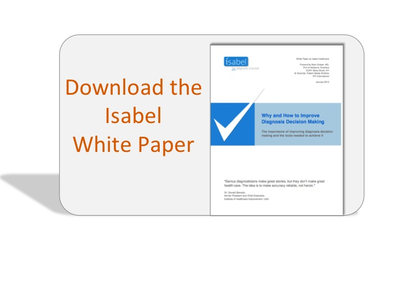- Privacy Policy
- Terms & Conditions
- Contact us
- ©Isabel Healthcare 2025
Why do Doctors get ill? Physcian Burnout is an issue
 Who feels like they’ve been stressed by their work? Chances are, at some point in your life your job has taken over and you’ve felt like you need a holiday. But how many times have you considered yourself ill from stress? In recent years, mental health has been gaining more and more attention, and so it should; the statistics would make anyone panic if they were applied to a physical illness or disease. An alarming 9% of people in the UK suffer from anxiety and/or depression alone, and 1 in 4 of us worldwide will suffer from a mental illness in any given year. That’s the same amount of young adults contracting an STD, the same amount of deaths from heart disease, and more than the amount of women diagnosed with breast cancer in the US.
Who feels like they’ve been stressed by their work? Chances are, at some point in your life your job has taken over and you’ve felt like you need a holiday. But how many times have you considered yourself ill from stress? In recent years, mental health has been gaining more and more attention, and so it should; the statistics would make anyone panic if they were applied to a physical illness or disease. An alarming 9% of people in the UK suffer from anxiety and/or depression alone, and 1 in 4 of us worldwide will suffer from a mental illness in any given year. That’s the same amount of young adults contracting an STD, the same amount of deaths from heart disease, and more than the amount of women diagnosed with breast cancer in the US.
Stress is one of the leading causes of mental health issues, and this is never more prevalent than in the healthcare environment itself. Physician burnout is a medical phenomenon we are still trying to understand, and it can be life threatening. In the same way we try to discuss symptoms for other diseases on our blog, in this blogpost we will highlight the signs, symptoms and causes of stress and burnout in medical professionals, so you can seek help when it’s needed.
What is Physician Burnout?
Stress itself is not considered an illness, but it is the cause of many diseases, physical and mental. Most, if not all, doctors experience high stress environments while at work. Combine this with a lack of approval for the work being done and an inability to cope with the stress, and the accumulative effect of these symptoms leads to a much bigger problem. The symptoms for physician burnout are split into four categories; physical, emotional, cognitive and behavioural.
Physical symptoms
- Headaches, often chronic
- Joint and Muscle aches
- Tiredness and lethargy
- Insomnia and other sleep disorders
- Weight loss or gain.
Emotional symptoms
- Irritability or bitterness
- Loss of humour or enjoyment in work or personal life
- Feelings of failure, blame and guilt.
- Depressed mood, or an apathy for work or social engagements.
Cognitive
- Poor concentration
- Suspicion and paranoia
- Distancing.
Behavioural
- Work avoidance
- Diminished personal conduct with clients
- Loss of empathy
- Inflexible behaviour.
What are the causes for Physician Burnout?
As an illness that is only recently thought of as even existing, there is still a lot of research to be done in determining the causes of physician burnout, and this may take some quite long term studies and a lot of work from leaders in psychology. At the moment, the main cause is thought to be the direct stress experienced in a hospital or surgery environment. Constantly coming into contact with illness, life changing or threatening diseases and even death can breed stress, which is elevated when faced with the responsibility diagnosing and treating those diseases. Another school of thought explores the way we train and educate our doctors. Becoming a doctor involves one of the longest training periods, and the transition straight from high school, to college, to med school can create a ‘bubble-like’ environment, which some say is like an extension of school and focuses too much on the academics, science, and assessments. We of course neeed assessments to ensure our doctors are sufficiently trained to care for the ill, but when thrown into residencies, the reality of social interaction and the responsibility of real people can be a shock to the system. Many are calling for more training in the patient-doctor interaction during med school. Another way in which the burnout epidemic could be treated from the ground up throughout med school involves therapy classes on dealing with the specific stresses endured by doctors. More research certainly needs to be done, and actions can then be put in place to help prevent our worlds’ physicians from experiencing this solvable mental health issue.


Jason Maude
Jason is the CEO and Co-founder of Isabel. Prior to co-founding Isabel, Jason spent 12 years working in finance and investment banking across Europe. His daughter, Isabel, fell seriously ill following a misdiagnosis in 1999 and this experience inspired Jason to abandon his city career and create Isabel Healthcare Ltd.
Subscribe Here!
Recent Posts
Isabel DDx Companion with ChatGPT Integration - to help you diagnose even faster
At Isabel Healthcare, we’ve always been driven by one goal: to make clinical reasoning faster,..Virtual Triage: Do more questions lead to better patient outcomes?
One of the common misconceptions related to virtual triage / symptom checker tools is that the more..List Of Categories
- Differential Diagnosis Decision Support
- Differential diagnosis
- Symptom Checker
- Symptoms
- Medical Error
- Patient Disease Information
- Disease
- Clinical Decision Support
- Diagnostic Decision Support
- Isabel 1 Minute Read
- Diagnosis Error
- Diagnosis Skills Cases
- Healthcare Informatics
- Clinical Reasoning
- Evidence-based Medicine
- Medical Education
- Patient Engagement
- Symptom Triage
- Nurse Practitioner Education
- Nursing Decision Support
- Partnership
- Public Health
- COVID-19
- EHR
- Patient Empowerment
- Patient Safety
- rare disease

Start your FREE Trial today
Try the Isabel Pro DDx generator for 30-days - no payment card details required.



